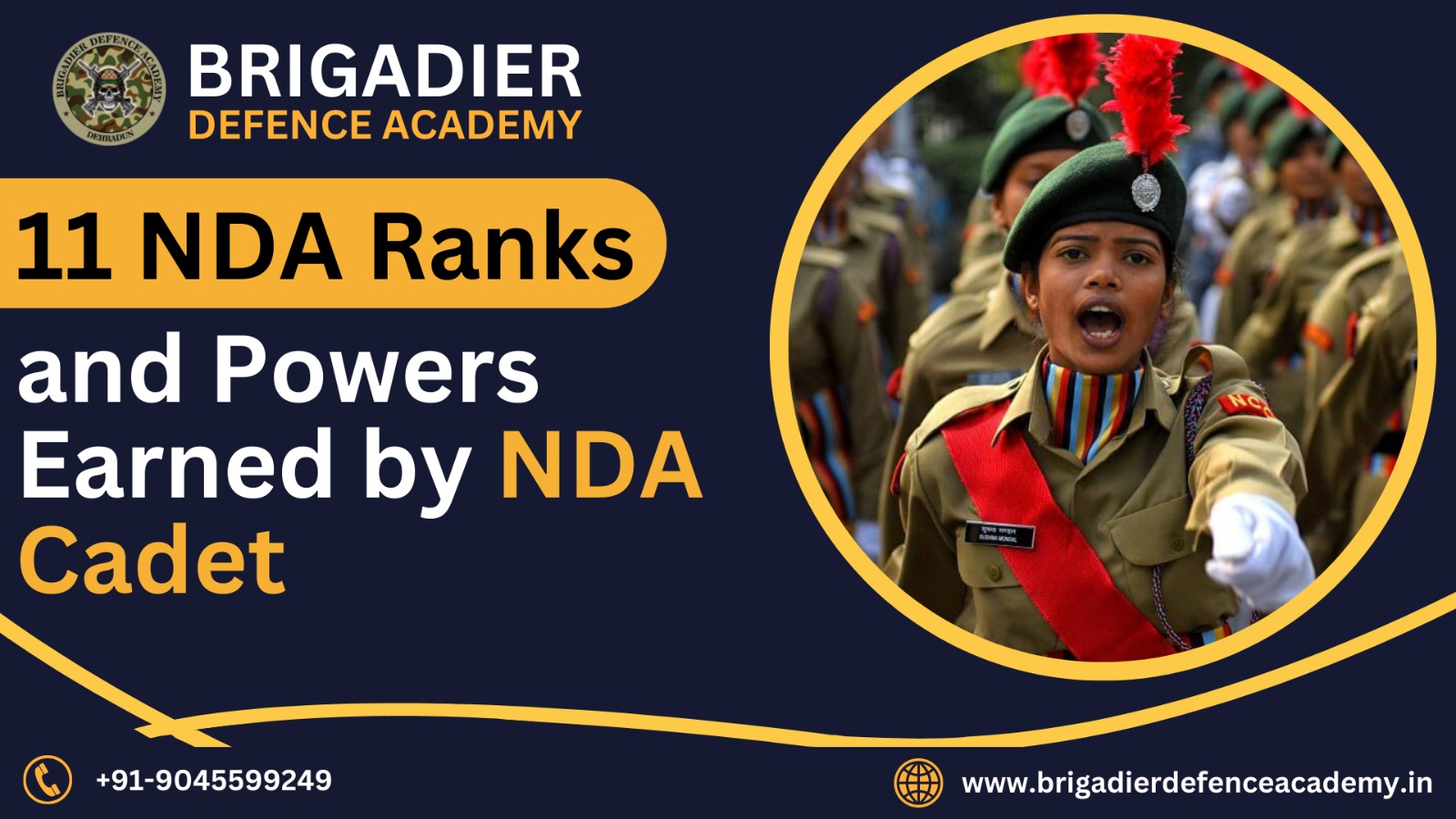- Posted on
- Manya
- No Comments
Introduction by National Defense Academy NDA Cadets in India
Here are 11 ranks and powers earned by National Defense Academy NDA Cadets in India:
- Cadet: The starting rank for a candidate joining the NDA Cadets. At this stage, they are undergoing basic training and are not vested with specific powers or responsibilities beyond those of a trainee.
- Senior Cadet: As cadets progress through their training at the NDA Cadets, they attain the rank of Senior Cadet. This is a transitional phase where they start taking on more responsibilities and leadership roles within their units.
- Under Officer: Under Officer is a rank given to a senior cadet who has demonstrated exceptional leadership qualities, discipline, and performance during their training. Under Officers assist in managing training activities and act as role models for junior cadets.
- Sergeant: Upon completion of their training and commissioning into the armed forces, cadets are typically given the rank of Sergeant. Sergeants hold a non-commissioned officer (NCO) rank and are responsible for leading small units, maintaining discipline, and ensuring operational readiness.
- Junior Commissioned Officer (JCO): In some cases, exceptionally skilled and experienced Sergeants may be promoted to the rank of Junior Commissioned Officer (JCO). JCOs hold a higher level of authority within the non-commissioned ranks and may lead larger units or specialized teams.
- Lieutenant: Upon successful completion of training at the NDA and the respective service academies (e.g., Indian Military Academy, Naval Academy, Air Force Academy), cadets are commissioned as Lieutenants in their respective branches of the armed forces. Lieutenants are junior commissioned officers and hold leadership roles within platoon-sized units.
- Captain: With experience and merit, Lieutenants can be promoted to the rank of Captain. Captains typically command companies or serve as staff officers in larger units. They are responsible for tactical operations, troop welfare, and mission success.
- Major: A Major is a field-grade officer rank attained through years of service, specialized training, and demonstrated leadership abilities. Majors hold significant command responsibilities, such as commanding battalions or serving as key staff officers at higher headquarters.
- Lieutenant Colonel: Promotion to the rank of Lieutenant Colonel signifies a senior command position within the military hierarchy. Lieutenant Colonels command larger units like regiments or serve in important staff roles at divisional or corps levels.
- Colonel: Colonels are senior officers who often hold critical command or staff positions at the brigade, division, or corps level. They are responsible for strategic planning, operations, and the overall readiness of their units.
- General Officer Ranks: Beyond the ranks of Colonel, officers enter the general officer ranks, which include Brigadier, Major General, Lieutenant General, and General. These ranks are associated with higher command responsibilities, strategic planning, and policy implementation within the armed forces.
Each of these ranks comes with specific powers, responsibilities, and privileges, reflecting the cadet’s progression through training and service in the armed forces. It’s important to note that the exact titles and responsibilities may vary slightly between different armed forces and countries, but the general progression from cadet to senior officer remains consistent in military organizations worldwide.
FAQ’s of NDA Cadets
- What is the National Defense Academy (NDA)?
- The National Defense Academy NDA cadets is a premier institution in India that trains cadets for entry into the Indian Armed Forces. It is a joint services academy where cadets from the Army, Navy, and Air Force undergo training together.
- What are the different ranks a cadet can achieve at NDA?
- The ranks a cadet can achieve at NDA cadets, Senior Cadet, Under Officer, and sometimes even Sergeant based on their performance and seniority during training.
- What is the role of a Senior Cadet at NDA?
- Senior Cadets at NDA Cadets take on leadership roles and responsibilities within their units. They assist in training junior cadets, maintain discipline, and uphold the standards of the academy.
- What powers do Under Officers have at NDA?
- Under Officers at NDA Cadets have more authority and responsibilities compared to cadets. They assist in managing training activities, mentor junior cadets, and help maintain discipline within their units.
- What is the significance of being commissioned as a Lieutenant?
- Commissioning as a Lieutenant is a significant milestone as it marks the beginning of an officer’s career in the armed forces. Lieutenants are junior commissioned officers and hold leadership roles within their units.
- What are the typical responsibilities of a Captain in the armed forces?
- Captains in the armed forces command companies or serve as staff officers. They are responsible for tactical operations, troop welfare, and mission success in their respective units.
- How does one progress to higher ranks such as Major or Lieutenant Colonel?
- Progression to higher ranks such as Major or Lieutenant Colonel is based on a combination of experience, performance, and specialized training. Officers must demonstrate leadership abilities and meet promotion criteria set by their respective armed forces.
- What are the powers and responsibilities of a General Officer?
- General Officers hold senior command positions and are responsible for strategic planning, policy implementation, and overseeing operations at various levels within the armed forces. Their roles can include leading divisions, corps, or specialized commands.
- Can NDA cadets choose their branch of service (Army, Navy, Air Force)?
- Yes, NDA Cadets can choose their branch of service based on their preferences and merit. After completing their training at NDA Cadets, they go to their respective service academies (Indian Military Academy, Naval Academy, Air Force Academy) to receive specialized training for their chosen branch.
- Are there opportunities for further education and specialization after NDA training?
- Yes, after completing their initial training and serving in operational roles, officers can pursue advanced education, attend specialized courses, and take on leadership roles in various fields such as strategy, logistics, intelligence, and engineering within the armed forces.
These FAQs provide insights into the progression, roles, and opportunities available to NDA Cadets and officers as they advance in their military careers.







